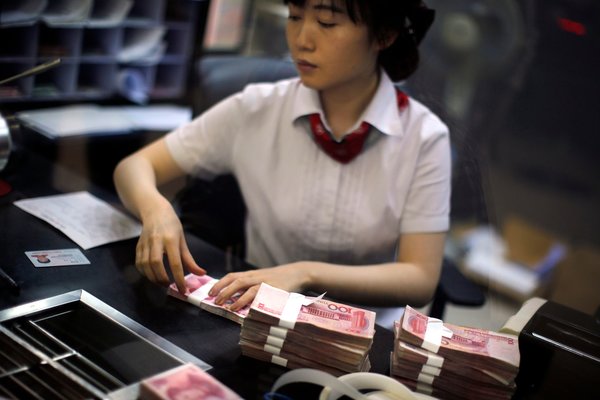
How prevalent is that opposition?
反对的声音在中国有多普遍?
It is surprisingly prevalent even among Chinese economists who are pro-reform.
反对的声音在中国令人惊讶地普遍,即使在主张改革的中国经济学家中也如此。
There is a good reason for that: If one takes economic theory and the practical experience of emerging market countries into consideration, China is doing it exactly the wrong way.
其背后有一个很好的理由:如果将经济理论和新兴市场国家的实践经验考虑进来,中国正在用完全错误的方法进行改革。
The right way to do it is to make domestic financial markets more sound, improve regulatory frameworks and make the exchange rate more flexible so that it can act as a shock absorber.
正确的方法是,先让国内的金融市场更加健全,完善监管框架,让汇率变得更加灵活,从而使之成为吸收震荡的工具。
Then you can open up the capital account.
然后你才可以开放资本账户。
But I think there’s a logic to China’s strategy.
但我觉得,中国的战略有其自身的逻辑。
Opening up the capital account isn’t just about money, because China doesn’t need money from abroad.
开放资本账户不只是为了钱,因为中国并不需要国外的钱。
But what comes with the money is very important.
但是,伴随钱而来的东西非常重要。
One example is where the Chinese government brought in foreign strategic investors into its banks.
一个例子是,中国政府将外国战略投资者引进银行。
In 2007, in particular, there was concern that there was no improvement being undertaken in the corporate and financial structure of the big state-owned banks.
特别是在2007年,人们当时担心大型国有银行的公司和财务结构没有得到改善。
The idea was that those foreign investors in the banks will have an incentive to bring with them better corporate governance practices and better risk-management practices.
中国的想法是,让外国投资者参与中国银行,将刺激他们把更好的公司治理实践和风险管理实践带到中国来。
So all these sort of collective benefits that come with the capital are what China wants.
所以,所有这些随资本而来的共同利益才是中国想要的。
The Chinese government prizes stability.
中国政府以稳定为本。
Will it give up control?
它会放弃控制吗?
China represents a grand and fascinating experiment in managing these two fundamentally contradictory impulses: trying to let the markets work freely versus trying to maintain stability and control in the market.
让市场自由运转,还是试图保持市场的稳定和对市场的控制,在管理这两个根本上相互矛盾的冲动上,中国代表着一次壮丽且迷人的实验。
We see that in a variety of contexts, and the currency is no exception.
我们在几件事情中都看到这点,货币也不例外。
The Chinese government would like the currency’s value to be more market-determined because they see that as important in terms of increasing the renminbi’s prominence.
中国政府希望本国货币的价值更多地由市场决定,因为他们认为那对提升人民币的地位很重要。
They view the stability of the currency as an important marker of their ability to manage the economy well.
他们将货币的稳定性视为自己能良好管理经济的重要标志。
This is going to create a number of stumbles and missteps in the future, and indeed it already has.
这将在未来制造一些失误和失策,这其实已经发生了。
Should the world be concerned about China’s growing financial ambitions?
世界应该担心中国日益增长的金融野心吗?
There is a positive view about this — that having China become more engaged with the international community is a good thing.
对这个问题有一种正面的看法,让中国更多地参与国际社会是件好事。
Rather than saying that it is a developing country and should be handled by different standards, China might recognize that ultimately having good rules governing international trade and finance would be to its own benefit.
与其让中国说自己是一个发展中国家,应该按不同的标准受到对待,不如让中国意识到,从根本上采用有关国际贸易和金融的良好规则将对其自身有利。
But I think there was also a fear that China could end up parlaying its economic heft into a more strategic influence that then feeds into its somewhat expansionist tendencies.
但我认为也有一种担心,那就是,中国可能最终希望把自己的经济力量转化为更具战略意义的影响力,然后将其注入某种扩张主义倾向。
In the past, and in fact until fairly recently, China took a fairly brute-force approach, using its economic clout to gain economic and political influence.
在过去,事实上直到最近,中国采取的方法都相当粗暴,用自己的经济实力来获得经济和政治影响力。
Now China has adopted what I think is a much more savvy and disciplined approach to its international engagement.
现在中国在国际事务的参与上,已经采取了在我看来是更加精明且更符合准则的方式。
First, it’s increasing its influence in existing international institutions, which allow it to influence the rules of the game from the inside.
首先,中国正在增加其在现有国际机构中的影响力,这将让中国能够从内部影响游戏的规则。
Second, it is setting up its own institutions like the A.I.I.B.
第二,中国正在建立自己的机构,如亚投行
[Asian Infrastructure Investment Bank] that allow it to redefine the rules of the game from the outside.
(亚洲基础设施投资银行),这将让中国能够从外部重新定义游戏的规则。
Third, it is bringing lifelines to countries, and bringing them [other countries] into its embrace by setting up institutions with them.
第三,中国在为一些国家提供生命线,通过在这些国家建立机构,将它们纳入自己的怀抱。
China is very effectively gaining what I like to think of as a multilateral sheen for its effort to build closer economic relationships with other countries.
在为本国与其他国家建立更密切经济关系的努力上,我认为中国正在卓有成效地获得一种多边光辉。
At a time when the political rhetoric in the US is about disengaging and questioning traditional lines both economic and political, I think China stands ready to fill in the void.
美国目前的政治词藻都是关于脱离、质疑传统经济和政治路线的,在这个时刻,我觉得中国已经做好了填补空缺的准备。
That is not intrinsically a bad thing.
这本身不是一件坏事。
But we have to remember many of the values the US in particular has fought for, or tried to expand, like supporting democratic forms of government, by-and-large free markets, freedom of expression and so on.
但我们必须记住那些价值观,尤其是美国为之奋斗、或试图推广的,比如支持民主形式的政府、大体上自由的市场、言论自由等等。
All those are anathema to China.
所有这些都是为中国所仇视的东西。











